Sunday Feb 22, 2026
Sunday Feb 22, 2026
Thursday, 3 December 2020 00:30 - - {{hitsCtrl.values.hits}}
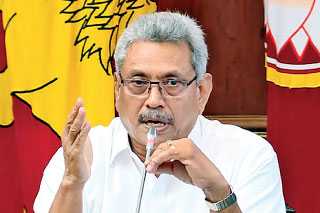
President Gotabaya Rajapaksa
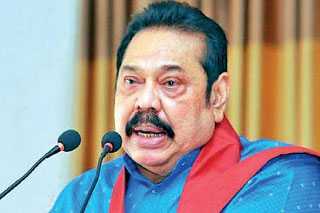
Prime Minister Mahinda Rajapaksa
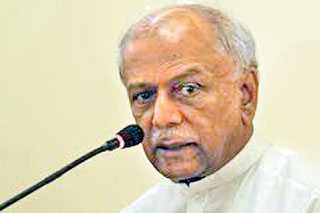
Minister Dinesh Gunawardena
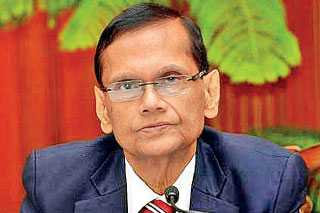
Minister Prof. G.L. Peiris
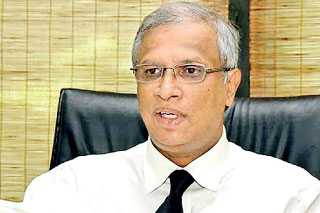
Parliamentarian M.A. Sumanthiran
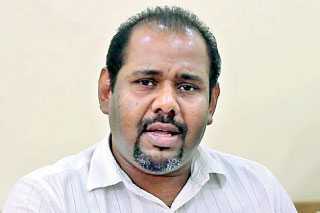
Parliamentarian Gajan Ponnambalam
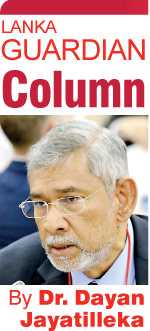
The substantive foreign policy debate during this Budget was between the SLPP and the Tamil Opposition. More specifically it was between Ministers Dinesh Gunawardena and Prof. G.L. Peiris on the one hand, and Parliamentarians M.A. Sumanthiran and Gajan Ponnambalam on the other. That debate, though superficially Sinhala/Tamil, south/north, was not simply that. It was an important and civilised clash of perspectives.
Each side said much that was correct but was partial, one-sided. Though the trees were of valuable timber, each side missed the wood for the trees. What Sri Lanka’s foreign policy lacks is the ability either to bridge the two perspectives or chart a middle path between them.
The keyword in the debate was sovereignty. Foreign Minister Dinesh Gunawardena and former Foreign Minister, currently the Minister of Education, G.L. Peiris argued strongly for the sovereign equality of states and non-interference, while Sumanthiran took the sovereignty of peoples—including, in Sumanthiran’s argument, the pre-existing, pre-colonial sovereignty of the Tamil statelet—as their ground. That latter point is untenable because when the kingdoms were brought together non-federally, and at the founding of independent Ceylon, the state form opted for was a unitary one as distinct from the separate referenda that the British insisted upon in India, yielding a quasi-federal compact.
Of the speakers in the debate on foreign affairs, Gajan Ponnambalam was something of an outlier, as he almost always is, but this time, he enunciated a most challenging, dialectically reasoned proposition which made his the most interesting single contribution to the discussion. Little wonder then that his speech was totally ignored.
The problem with both sides in the sovereignty debate was that they were standing on principles rather than practice, matters ‘de jure’ rather than ‘de facto’, the ‘ought’ of things rather than the ‘is’.
Taken together, their contending discourses would bring us to a closer approximation of the reality of how the world works—but they aren’t taken together.
Partial perspectives
The Dinesh Gunawardena-G.L. Peiris argument of absolute national/state sovereignty and non-interference, is unsustainable. If sovereignty were the reality of world affairs, Sri Lanka would not have experienced the shock of July 1987 and our global isolation.
Dinesh Gunawardena and G.L. Peiris, undoubtedly able, are constrained by the Gotabaya framework which has forgotten the lessons of 1987 or learned the wrong ones and is trying to put the clock back to pre-1987, if not worse: imagining that the rise of China has actually put the clock back to pre-1987 for Sri Lanka.
By contrast, all Sri Lankan Presidents since 1987, including Mahinda Rajapaksa, operated within the post-1987 Realist framework. The newly-elected President MR told me emphatically over dinner in late 2005, as we discussed the international factors in the absence of Lakshman Kadirgamar and the scenario of the return to war by Prabhakaran: “I really don’t care about anybody else so long as I have India on my side.”
If the world always functioned according to the admirable principle of the sovereign equality of states and consequent non-intervention in internal affairs, the country formerly known as Yugoslavia would still exist, while the provocative adventurism of Georgia and the Ukraine would not have cost them part of their territories.
The same goes for the ‘sovereignty of peoples’ as evocatively championed by Sumanthiran, and the vanishing of ‘state sovereignty’ as proclaimed by him. Tell that to Tigray and the decisive, relentless (Nobel-prize winning) Ethiopian leader.
As for Sumanthiran’s entirely justifiable and accurate reiteration of the repeated promises made on the record to India by the Mahinda Rajapaksa presidency, the question remains as to why the TNA did not take those promises as their premise and press for the implementation of the 13th Amendment rather than trying to push the boundaries of the 13th Amendment (2011-2012), and subsequently vaulting over the 13th Amendment and pushing for a new Constitution which deleted Sri Lanka’s unitary status—which was one of the factors that killed off the UNP.
The MR Government found it far easier to renege on the promise made to India because the TNA itself let the Government off that hook, which was the only hook it was and is on. Having absurdly sought after the massive wartime defeat and despite it, to push beyond the provisions on land policy in the 13th Amendment and demanded in 2011-2012 that even State land could be utilised only with the permission of the provincial Chief Minister—a demand that incensed Mahinda Rajapaksa—the Tamils now experience daily, a creeping contestation over their traditional lands and the creation of ‘facts on the ground’ (Netanyahu-style) under a decidedly more hawkish President and his like-minded Eastern Governor.
Cyril Mathew’s ghost
Gajan Ponnambalam’s argument was conceptually more complex and subtle than that made by Sumanthiran. It was also closer the bull’s-eye and therefore did not elicit a response from the government benches. Ponnambalam’s point was that the Sinhala-Buddhist political elite sought to balance against India because of a perception of Indian support for the Tamils of Sri Lanka. The ruling elite first tilted towards the USA in the 1980s and paid the price, and it is now doing the same by tilting strategically towards China and will similarly pay a price.
The root cause, the Original Sin, says Ponnambalam is the Sinhala ruling elite’s unwillingness to share power fairly with this country’s Tamil citizenry. Ponnambalam predicts that this time, if the deprivation of Tamil rights and land goes too far, and is coupled with a continuing, deepening strategic Sri Lankan alignment with China in the current context of great power competition, the Sinhalese, though they may succeed in destroying Tamil sovereignty for a generation, would have only engaged, ironically, in what amounts to Mutually Assured Destruction because they will find their own political and State sovereignty shattered by external factors and forces.
Evidence for Gajan Ponnambalam’s thesis was the verbal virulence and viciousness the Minister of Public Security Rear-Admiral (Retd.) Sarath Weerasekara aimed at M.A. Sumanthiran MP over his presence at the home of a client, the mother of a slain LTTE cadre of some considerable notoriety, where the woman had lit a lamp in commemoration. Minister Weerasekara’s unfamiliarity with Sophocles’ Antigone was the least worrisome of his lapses.
What Weerasekara said to Sumanthiran reeked of Minister Cyril Mathew’s attacks on TULF Leader Amirthalingam in 1977-’83. Mathew’s sustained hate speech and neofascist networking triggered a chain-reaction: a pogrom and eventual external intervention. However, President JR, unlike President GR, didn’t compound his myopic folly by appointing Mathew the Minister of Public Security, including the Police and the Civil Defence Forces, with plans for “Civil Defence Committees [which] will be formed in each village in the country to keep a watchful eye…like during the war times.” (Daily Mirror)
When he boycotted the 2005 presidential election, Velupillai Prabhakaran bet on a hardline racist Rajapaksa regime alienating world opinion and thereby isolating itself internationally, rendering Tamil Eelam more easily attainable. Picking the wrong method (warfare) and the wrong Rajapaksa (Mahinda), Prabhakaran was utterly vanquished.
Distressingly, Prabhakaran’s polarisation hypothesis may have a chance of posthumous validation in the present, due to the following:
(1) Denoting a tectonic shift, the regime is the most hawkish, absolutist, militarist, ethno-hegemonistic, ideologically rigid and extremist, unilateralist, and the remotest from the liberal-democratic ‘open society’ model and global political community, ever in the island’s post-Independence history.
(2) It will formalise its ethno-religious supremacist ethos in a new Constitution, which will widen the gap with India which has an unprecedented interface with the USA not only strategically but also socially (many Biden nominees and staffers are Indian-American).
(3) It is dependent upon, influenced by, and integrated with China to an unprecedented degree at a time of heightened Great Power competition.
(4) It is going counter to the emerging Biden-Harris led, post-Trump global zeitgeist of democratic, anti-racist/anti-supremacist internationalism.
(5) The Tamils, especially Tamil women, are more high profile and influential than ever before in the global political and social mainstream from the USA to New Zealand.
The Tamil external advantage is hampered by the political cyanide-capsule of the delegitimising Tiger suicide-terrorist cult, manifested in the grotesque Mahaveer commemoration in Britain, replete with the inverted rifle symbol, which no US administration (however liberal) or India can afford to be seen to countenance or ignore.
So, Gajan Ponnambalam may prove prophetic—but only partially. As examples from Afghanistan to the Middle East show, even with an externally shattered state, the majority ethno-religious community, civilisation and culture reassert themselves, often in a more virulent, fanatical and fundamentalist form such as the Taliban and ISIS. The repressed returns, zombielike.
An externally-imposed, as distinct from externally-propelled and supported, solution is unsustainable and counterproductive. A viable, sustainable strategic policy must locate the intersection of the majority and the minority, the external and the internal.
Unsustainable ‘Sinhala First’
The Gotabaya presidency seems to think that with the exception of China, and because of that exception, Sri Lanka’s relations with others can be (a) on our own terms and (b) on the premise of ‘Sri Lanka First’ i.e. that Sri Lanka’s interests as refracted through the prism of the Sinhala majoritarian self-perception, can be the dominant or determinant factor in all relationships.
It would be wise for the Gotabaya presidency to understand how Jake Sullivan, the Biden-Harris administration’s incoming National Security Advisor, perceives the triple threat posed by China, and therefore for the GR regime to weigh the risks of identifying itself with that threat:
“There is China’s long-term strategy to dominate the fastest-growing part of the world, to make the global economy adjust to its brand of authoritarian capitalism, and above all to put pressure on free and open economic and political models...” (Sullivan, American Exceptionalism, Reclaimed – The Atlantic)
As Wikileaks revealed, Sullivan, a top staffer of US Secretary of State Hillary Clinton in May 2009, participated in her discussions on the end-phase of the Sri Lankan war, and the unresolved Tamil issue.
It would puzzle and perturb President Gotabaya Rajapaksa that the incoming Biden administration rejects the thematic slogan and policy paradigm of “America First” while asserting that “America is back!” and aspiring to lead the world once again. The explicit critique and rejection of ‘America First’ was commenced by Sullivan and Anthony Blinken, the incoming US Secretary of State. On New Year’s Day 2019 Blinken wrote a piece in in the Washington Post unambiguously entitled ‘America First is only making the world worse. Here’s a better approach’.
Sinhala supremacism would see this as a contradiction in terms and fail to understand why ‘America First’ would not be the ideal basis for strong leadership of the world. Supremacists wouldn’t see that even the most powerful nation on earth, the USA, cannot safeguard, still less advance, its national interest on that narcissistic basis.
The Biden-Harris administration’s foreign policy team understands two fundamentals. Firstly, that foreign policy focuses upon, has as its subject matter, international relations, i.e., relationships; secondly, that a state however powerful cannot go it alone or only with a few allies, and that a restoration and multiplication of durable networks of allies/partners is both goal and test of a successful foreign policy strategy.
Secondly, it understands as JFK did, that America’s relations within its society and what the world sees about them, impact on America’s international relations. Trump’s ‘America First’ slogan was a reflection of white majoritarian-supremacism in the USA, as the core of a neo-isolationist unilateralism in the world. It reduced the image and stature of the USA among the world’s states and peoples. The ultranationalist, supremacist ethno-religious cultural assertion of another nation, however rich or powerful, makes broad alliances more difficult, unsustainable.
What is true of the world’s sole superpower is most certainly true of a small island. You cannot have a successful foreign policy based on the externally repulsive projection of your supremacist domestic identity politics of “race, religion and culture”.
Conversely, if the majority of voters think that the national identity and interests will be sold out, as with the UNP government’s unpardonably treacherous co-sponsorship of Geneva 2015 (which I was the first to denounce publicly), the electorate will not give such a party of elitist neoliberal-globalism another opportunity of making foreign policy and steering Sri Lanka through the world.
Foreign policy doctrine
The country I was born into was global ‘Southernist’, ‘Western’ liberal-democratic and attitudinally internationalist. Among our Foreign Ministers, Lakshman Kadirgamar was the finest representative and symbol of that synthesis. Today, neither the UNP/para-UNP nor the Gotabaya mindset, regards Sri Lanka as belonging to the Global South. Furthermore, the GR paradigm is antagonistic to the “free and open economic and political model” (Sullivan).
The para-UNP imagines Sri Lanka as a state of the USA or the EU. The Gotabaya grouping imagines Sri Lanka is a de-facto protectorate of China and South Asia’s Israel.
Both outlooks are irrational, delusional, self-destructive.
Foreign policy is that which provides a framework and guideline for a country’s relations, or more correctly interrelations, with others. It must hold in balance the categories of people, nation, state and world, which constitute a parallelogram of forces.
Sri Lanka’s enlightened self-interest, as that of the collective interest of our family and home, the Global South, is best served by (I) a democratic world order and (II) global equilibrium, with a basic balance in the Asian arena and the Indian Ocean.
While having our feet planted firmly in the Nonaligned movement and the Nonaligned principles, dating back to their source in Bandung 1955, Sri Lanka must hope that when one side attempts to dominate, the other side can and will restore the balance. We may have to “lean to one side” (Mao), i.e., tilt to that side, and this time around, “call in the New World to redress the balance of the Old” (Canning). Sri Lanka’s basic strategy must a ‘multi-vector’ (Primakov)/‘tous azimuths’ (De Gaulle) approach of multipolar-balancing.
Jake Sullivan sketches an excellent conceptual synthesis for a foreign policy: “An… ultimately successful foreign policy must cut through Trump’s false, dog-whistling choice between globalism and nationalism. It must combine the best kind of patriotism (a shared civic spirit and a clear sense of the national interest) and the best kind of internationalism (a recognition that when your neighbour’s house is on fire, you need to grab a bucket). And it should reject the worst kind of nationalism (damn-the-consequences aggression and identity-based hate-mongering) and the worst kind of internationalism (the self-congratulatory insulation of the Davos elite) …Exceptionalism is how you reconcile patriotism with internationalism.” (Sullivan, Ibid.)
I was 10 when I first heard The Beatles’ ‘When I’m Sixty-Four’—and that age seemed unimaginably distant. Today, I turned 64, deriving some modest comfort from, among more precious personal things, the fact that the world-outlook elaborated in my book ‘Long War, Cold Peace’ (2014), expressed as ‘Smart Patriotism’ in public lectures and print (2015-2017), and decisively rejected by the Gotabaya camp with its Trump-Netanyahu-Bolsonaro turn (2018), is demonstrably, quintessentially, consonant and congruent with Jake Sullivan’s outline of a foreign policy paradigm.